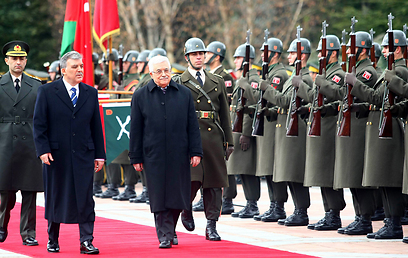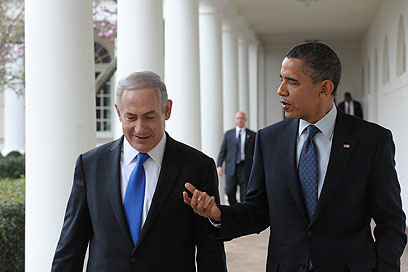Quiet intifada: Abbas' statehood plan
Analysis: UN recognition, pressure from Obama, Israel's isolation and a 'peaceful intifada' – this is how the Palestinians plan to achieve statehood without having to forgo right of return or recognize Israel as Jewish state
Over the past few weeks Palestinian Authority Chairman Mahmoud Abbas began implementing a plan which, if successful, will grant the Palestinians legal and binding international recognition in their own state within the 1967 borders without obligating them to recognize Israel as a Jewish state, give up on the right of return or agree to limited Israeli military presence along the Jordan River.
In the first stage of Abbas' plan, the international community, by way of the UN Security Council, will recognize a Palestinian state along the 1967 borders. According to international law, a resolution is a legally binding document. In the next phase he plans to return to the negotiation table with the sweeping support of the international community to work out the details of a permanent agreement with Israel.
If during this stage Israel will insist on its demands, the international community will impose economic sanctions such as those that were imposed on the Apartheid regime in South Africa at the time. Abbas believes that by implementing this plan he will be able to give his people an independent state – more or less along the Green Line borders - in two or three years, without having to confront Hamas or face mass demonstrations in the territories and the world.
Information obtained by Israeli officials from the Palestinian territories and abroad indicates that the plan has already entered its first phase of implementation, despite the fact that Abbas and his aides are aware of the difficulties in executing it. The Palestinians must convince the five permanent members of the Security Council - headed by the US – not to veto a draft resolution on the establishment of a Palestinian state. The Palestinians must also secure a majority for this resolution within the Security Council.

Diplomatic ammunition. Abbas in Turkey (Photo: AFP)
In the current diplomatic situation there is no chance that the Security Council will support such a resolution, but Abbas believes he can turn things around within two to three years through intense diplomatic efforts and a media campaign.
The Palestinians are counting on the Obama Administration's complete rejection of Israel's settlement enterprise, and assume that in his second term the American president will be less sensitive to the wishes of Israel's supporters in the US and will not rush to automatically back the Israeli government in the UN. There is already some indication that things are headed in this direction, and yes, the Palestinians are also counting on the strained relations between Obama and Netanyahu. To leverage these advantages, Abbas is sending some of his ministers for talks in Washington to coordinate positions with senior officials in Obama's second administration: The secretary of state, national security adviser, defense secretary and the ambassador to the UN.

PA counting on strained relations. Netanyahu and Obama (Photo: Amos Ben-Gershom, GPO)
The Palestinians are also working to further isolate Israel in the international arena until it becomes a "pariah state." To this end, they are conducting an international campaign to delegitimize the West Bank settlements. In addition, to provide diplomatic ammunition and propaganda for their plan, the Palestinian leadership is fomenting controlled unrest in the West Bank territories.
While Israeli intelligence officials and politicians argue over whether a third intifada has erupted, the PA has already activated a "soft intifada" - or an "awareness intifada." The goal is to methodically place their demands at the top of the international media's agenda while avoiding violence and terror. The PA is initiating dozens of non-violent provocations, or provocations that involve a minimal level of violence – without the use of weapons or explosives – such as the building of "outposts" in Area C, holding demonstrations near disputed sites such as Bil'in, and throwing rocks and Molotov cocktails.
Fatah operatives and PA clerks refer to this growing phenomenon as a "peaceful intifada," but these tactics are meant to provoke violent responses from Israeli security forces, which also make for good photos for the international press. Foreign news teams are invited to the scene in advance, so these incidents become victories in the Palestinian "awareness" campaign.
The Palestinian street is willingly cooperating because this campaign offers youngsters who are frustrated with the economic situation and with the fact that the Arab Spring has not reached the PA an opportunity to blow off some steam. This intifada also overshadows Hamas, which halted the rocket struggle against Israel following pressure from Egypt.
The fourth aspect of this strategy is a policy of inner-Palestinian reconciliation and recruiting the support of Arab countries. The goal is to make Abbas appear as a leader who is uniting all the Palestinian factions under his flag. In this way, he goes back to being the legitimate representative of a united public that demands its rights in the UN.
Seemingly, this strategy has a reasonable chance of succeeding, and this obligates the Israeli government to urgently formulate a counter-strategy. There are those in Israel who will say 'let the Palestinians and the international community do our job for us and save us from the nightmare of a binational state'. Others will say that we mustn't allow them to determine Israel's permanent eastern border, as this may put Israeli citizens at risk in the long run.
In any case, the next government must act immediately to try and thwart Abbas' plan, if only because the quiet intifada may spin out of control and transform into an asymmetrical violent conflict. Therefore, as soon as it is established, the next government in Jerusalem will have to demand that the world force Abbas to return to the negotiation table at once, even it means that Israel will have to freeze settlement construction for a while.










